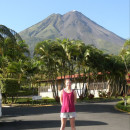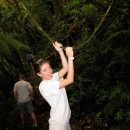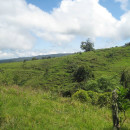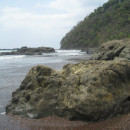Costa Rica: a much-needed kick to my life that I will never forget! Pura Vida! Past Review
By Brianna G (Journalism/Professional Writing, The College of New Jersey) for
ISA Study Abroad in Heredia, Costa Rica
While there were some things I was not happy about, looking back I wouldn't change a thing. After all, I wasn't there to have a vacation; I was there to have a life experience. I now think it should be required for all students to study abroad at some point during their college careers, because everyone I know who has gone abroad now has a whole new view on the world and I am certainly no exception. After living in a foreign country, I am not only much more understanding of foreigners but also much more understanding of the different cultures within my own country (a result of studying abroad with a very diverse group of other U.S. students)! Really, studying abroad is just so important and life-altering that it is hard to describe. The best I can do is this: you never truly see something before you see it through the eyes of someone completely different from you.
Review Photos




Personal Information
| How much international exposure did you have prior to this program? | 0-2 weeks |
Review Your Program
|
* Overall educational experience
Academic rigor, intensity, resources, etc. |
I know many people who have studied abroad in other countries, and every last one of them has said that the work there was easy. Not so with my program. The professors and ISA-Costa Rica took class attendance and work very seriously. I worked just as hard there as I do in my home university, and my home university is known to be challenging. This would have been fine, except for the fact that I was a foreign student and my friends and I wanted to go explore the country and do fun things! We would have been able to do so much more had we not had such challenging/serious classes. |
|
* Host Country Program Administration
On-site administration of your program |
For the most part, the ISA administration is fantastic. Just be aware that they may not know of all the cultural differences that exist between you and them. |
|
* Housing:
How satisfied were you with your living arrangements? |
I GOT THE BEST FAMILY IN THE ENTIRE PROGRAM!! The host family I stayed with was absolutely wonderful and I still chat with them online sometimes. They didn't speak English, and I was the only person in my study abroad group that didn't get a roommate (odd number of people), so I was a little scared at first. However, I definitely got the best living situation as some people ended up having some roommate tension and one pair of roommates despised their host family. The others all liked their living situations a lot, but after a while it became clear that I was the only one not being treated like a guest in my house. Rather, I was treated like one of the family and I truly felt like they were my family. I really hope to go back one day for a visit :) |
| * Food: |
First, my main advice is to never turn down anything your host mom gives you (unless she is trying to feed you too many snacks when you aren't hungry!). This is by the best way to experience the food there. Like me, you may also discover you like things that you always turned up your nose to before! Although some of the food looks similar to Mexican dishes, don't expect the same flavors or spiciness. Personally, I loved the food there (probably because my host mom was such a great cook). I ate the national dish, Gallo Pinto, almost every day and it always tasted great. If you get tired of traditional food though, there are plenty of other options that are either the same as the U.S. or very similar. There is even a large selection of international cuisine due to the large number of other cultures that have immigrated to Costa Rica. If you do live in Heredia, be sure to find a small restaurant along the main street with a sign that says "Comida Libanesa". This is a Lebanese place, which we visited several times because the food and people who run it are wonderful. I highly suggest getting the "Shawarma Especial" ;). |
|
* Social & Cultural Integration:
How integrated did you feel with the local culture? |
While you do visit museums and historical buildings in Costa Rica, you will be mostly doing activities in the great outdoors! Unlike Europe study abroad programs, this one is for the more daring and adventurous (not saying that there isn't adventure in Europe, but with CR you will really get OUT there!) Much of your exploring and adventures will help whip you into shape physically, and almost everyone in my study abroad group actually lost weight rather than gaining it like our friends studying over in Europe (I'm REALLY not trying to bash Europe study abroad programs, but I am being honest). My favorite organized trip by ISA was by far the trip to the Arenal Volcano because there was just so much to do there! And we were right next to a giant active volcano! Of course, I also went to a ton of beaches and each were great (visit Manuel Antonio national park if you want the best!) Other activities included white water rafting (this makes rafting in the states look like a kiddie ride!), rappeling down rock faces and waterfalls, zip lining, hiking, bungee jumping and more. Of course, I did get plenty of time experiencing and learning about the culture. Living with a host family definitely helps this, but so does exploring the city. At one point I went to town in the mountains for a festival with some friends. It was a much tamer weekend than we were used to by that point, but it was still fun and we learned some new things. I don't want to give away too much about the culture here though because trust me when I say it is much more fun finding out for yourself! |
|
* Health Care:
How well were health issues addressed during the program? |
|
| * Safety: |
They will tell you many things about the potential health risks and safety issues you should be aware of, and yes you should be aware of them. HOWEVER, do not take them overly seriously because these are primarily targeted toward tourists and you will not exactly be a tourist because you will be LIVING there. For example, they say not to walk around with your iPod because someone will steal it. I adhered to this at first, but then I realized that so many locals around me walked around listening to iPods. Long story short, once I started acting like a local I exhibited more confidence and blended in better. If you like a scared tourist, then you will be at a much higher risk. One thing you follow however is to NEVER walk alone at night! Even the locals follow this rule strictly. When it gets to be very late, you shouldn't even be walking around if you have company because you will all most likely run into trouble. (Two guys in my group got mugged twice, and both times they were out late on foot and were drunk). Basically, the only people out at those hours on foot are up to no good! Other than that, consider the overall danger level to be about the same as any major U.S. city. Now for health. I personally received no shots or medications prior to going or while I was there. Maybe I just got lucky, but I will say that the only person in my group it did get pretty sick was someone who did get all the possible vaccines and took medications. Yes, we both remarked on the irony of it. Nevertheless, be sure to bring bug spray if you venture over to the Limon province because the only known cases of malaria are from there. Also, do not drink the tap water in Limon (even though I and a couple of my friends did because we found ourselves ridiculously thirsty and not near a store to buy water!) Everywhere else should be fine, but you might want to ask "es el agua potable?" before drinking if you are ever unsure. |
| If you could do it all over again would you choose the same program? |
Yes
|
Finances
|
* Money: How easily were you able to live on a student's budget?
(1 = not very easy/$200+ on food & personal expenses/week, 2.5 = $100/week, 5 = very easily/minimal cost) |
|
Language
| * Did your program have a foreign language component? | Yes |
| Language acquisition improvement? |
I did not live in a touristy area of the country, and therefore everyone around me spoke Spanish all the time. As soon as I got there, my Spanish started improving out of necessity! Some advice to future students: don't be afraid to try speaking Spanish and never assume that the other person knows English. Also, you will likely be surprised by how much Spanish you actually do know and how fast you will pick it up! |
| If applicable, to what degree did your living situation aid your language acquisition? |
|
Other Program Information
|
* Where did you live?
Select all that apply |
|
|
* Who did you live with?
Select all that apply |
|
A Look Back
| * What do you know now that you wish you knew before going on this program? | This program is right for a college longing for an escape and some adventure. The ideal student should also want to work on their Spanish! As cliche as it sounds, studying abroad really does change your life and this is one program that certainly changed mine. |
Comments
AWESOME review!! It is evident that this program really changed you and your energy (as well as your attempt to maintain a neutral stance on Europe!) made this review an absolute pleasure to read. I also love your advice: "once I started acting like a local I exhibited more confidence and blended in better." Not only does integrating into the culture result in better language acquisition, but it really is safer! Thanks for sharing your experience!
Mike July 11, 2011








